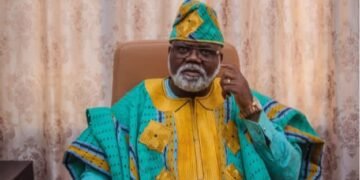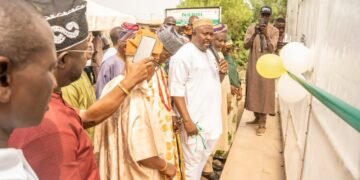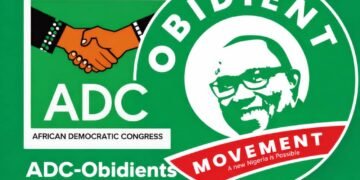The United States Ambassador to Nigeria, Richard Mills Jr., has confirmed that Nigerian deportees, including convicted prisoners, will be repatriated to Lagos. The Nation Report
Speaking during a meeting with Nigeria’s Minister of State for Foreign Affairs, Ambassador Bianca Odumegwu-Ojukwu, Mills Jr. stated that there would be no alternative drop-off locations such as Port Harcourt or Abuja.
“The first group will be convicted prisoners—those who have committed crimes and are currently in US prisons. Some have also violated US immigration laws, appealed, but were denied and still remain in the US,” Mills Jr. said.
Concerns Over Dignified Repatriation
In response, Odumegwu-Ojukwu called for the US government to ensure a dignified deportation process for affected Nigerians, in line with international conventions.
She urged the US authorities to provide ample time for deportees to retrieve their assets and mitigate the trauma of repatriation.
“With the new administration in the US, we seek commitments on a dignified return process. As of now, we are informed that about 201 Nigerian nationals are in US immigration camps, with 85 already cleared for deportation,” she said.
The minister expressed concern over the economic impact of the deportation, noting that many Nigerians abroad support their families back home through remittances.
“We have families in the hinterlands who rely on these deportees for survival, including children whose school fees are paid from funds sent from the US. The emotional and financial distress is far-reaching,” she added.
Drop Box Visa Policy & Student Concerns
Odumegwu-Ojukwu also sought clarity on the possible suspension of the US Drop Box Visa System, which allows for easier visa renewals. She called on the US government to issue a formal statement to allay fears among Nigerians.
Additionally, she highlighted the concerns of 14,000 Nigerian students in the US and their parents, who worry about potential changes in student visa policies under the new administration.
USAID and Economic Partnerships
On the future of USAID’s operations in Nigeria, the minister urged the US government to sustain the initiative, warning that humanitarian projects in Africa could suffer if the agency’s funding is reduced or suspended.
“We appeal that even if USAID is restructured, its core objectives should remain, ensuring that vulnerable communities are not abandoned,” she said.
She further called for stronger bilateral economic relations between Nigeria and the US, particularly in post-pandemic trade and investment. She suggested increased US involvement in Nigeria’s mining sector, as part of efforts to boost exports and economic diversification.
US Responds: No Suspension of Drop Box Visa Policy Yet
In his remarks, Ambassador Mills clarified that the Drop Box Visa System had not been suspended but was under review, as is customary when a new administration takes office.
He also acknowledged concerns over democracy in Africa, the security crisis in the Sahel, and the withdrawal of three countries from ECOWAS.
On USAID, Mills assured that discussions were ongoing, particularly in areas of healthcare and humanitarian aid, and that a final decision would be made in due course.
“The USAID review is ongoing. We recognize the impact of its programs, especially in life-saving healthcare initiatives,” Mills said.
He expressed optimism about strengthening Nigeria-US relations, emphasizing the importance of economic, diplomatic, and counterterrorism cooperation.













